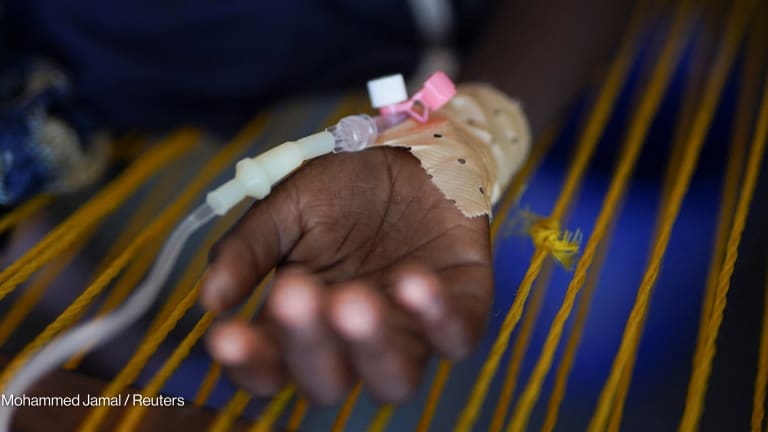
NAIROBI — Massive outbreaks of cholera swept through parts of Africa and Yemen last year, as drought and conflict crippled the health response in many countries. As land dried up, people drank whatever water they could find, no matter the level of contamination. Large-scale displacements of people led to the spread of the disease, with border regions becoming some of the hardest hit. Refugee and internal displacement camps hosted people in crowded, unsanitary conditions, creating breeding grounds for the disease to spread. In some cases, water infrastructure was targeted by militants, leading to outbreaks that overwhelmed local capacity to respond.
But amidst the crisis, there were some countries that appeared to be immune to cholera — at least on paper.
Ethiopia was one of them. More than 48,000 cases of “acute watery diarrhea,” or AWD, were reported in the country last year, with more than 800 deaths, but not a single case of cholera.
But the realities on the ground told a different story, according to humanitarian actors. It’s not that cholera didn’t exist in Ethiopia, but rather that the semantics around cholera outbreaks have long been politically charged, and the government refuses to use the word. Observers speculate that governments stay tight-lipped in the midst of these health crises because they fear that a formal declaration of cholera could impact trade and tourism, or flag to the international community that the nation has failed to provide basic services to its citizens, including clean water and functional toilets.
See more related topics:
► Uganda cholera outbreak slows, but violence in DRC complicates recovery
► DRC cholera outbreak hampers humanitarian efforts, worries neighbors
► Volunteers and loudspeakers: How a local response curbed Somaliland's cholera outbreak
► Sierra Leone taps global cholera vaccine stockpile to prevent outbreak
The Ethiopian government is not alone in its denial. Sudan’s Ministry of Health reportedly fired the head of a hospital’s emergency services last year for acknowledging that there was a cholera outbreak, arrested three others for engaging in a cholera awareness campaign, and arrested a journalist for reporting on the outbreak. The Kenyan government delayed in acknowledging a cholera outbreak at a high-end hotel in Nairobi last year, blaming food poisoning despite lab results confirming it was cholera. And former Zimbabwe President Robert Mugabe declared during a massive outbreak of more than 16,000 cases in his country in 2008 that "there is no cholera."
The unwillingness to call cholera by its name creates a complex operating environment for the humanitarian sector, which needs to ensure that its response to the disease is effective, while safeguarding the ability to continue operating in these countries. This can mean walking a political tightrope.
Playing with words
AWD is the umbrella term for a variety of diarrheal diseases caused by bacterial, viral, and parasitic organisms. Cholera is just one type of AWD, specifically caused by the Vibrio cholera bacteria present in fecal-contaminated water or food. Cholera can kill within hours if left untreated and can spread faster and be more severe than other types of AWD. While other forms of AWD tend to only kill children under 5 years old, cholera also kills adults. In order to declare cholera, lab testing must identify the presence of this bacteria. Because of its ability to spread quickly, one confirmed case is considered an outbreak.
Ethiopia is believed to have led the charge on popularizing cholera denial, having suppressed information on the nation’s outbreaks for decades. A 1985 Washington Post article reported that amidst the infamous famine that killed hundreds of thousands, the government refused to acknowledge the presence of cholera. A Médecins Sans Frontières official is quoted as saying, "I have 20 deaths a day because of a disease that we cannot name. I am importing medicines, and I have to lie about the name of the disease.” A declaration of cholera would have made it easier to get drugs into the country, enforce quarantines and bring in investigators to track down and target the source, he added.
Many humanitarian actors have mirrored the government’s language as a survival strategy to continue operating in countries that deny the presence of cholera. In a UNICEF humanitarian report from the end of last year on South Sudan, the agency refers to a national cholera outbreak, which the South Sudanese government had been upfront about. In neighboring Sudan, a report from UNICEF refers to a national outbreak of disease as AWD. In this case, while according to a report published by the Assessment Capacities Project there was in fact a large-scale cholera outbreak in Sudan, the government had never declared it.
In a press release issued last year about the regional outbreak, the Norwegian Refugee Council outlined cholera caseloads by country in Yemen, Somalia, South Sudan, and Kenya, referring to “cholera” in each country. The last country listed was Ethiopia, which referred to the AWD caseload, sourcing figures from the United Nations Office for the Coordination of Humanitarian Affairs. In some places, such as in Somaliland, cholera is largely referred to as a combination of the two, or AWD/cholera.
Beyond trade, tourism, and pride, denying the presence of cholera is also a numbers game. A country’s case fatality rate is reduced when the denominator, which would be the total number of cases, is higher. This happens when a country combines all cholera cases and all AWD cases. The death rate, in effect, declines, making it appear as though the country is handling the outbreak more effectively than its neighbors, a humanitarian worker told Devex. The worker asked to remain anonymous due to concerns that criticisms could impact their organization's ability to operate in countries that don't acknowledge cholera outbreaks.
Regardless of the motivation, World Health Organization member states are expected to declare cholera if two of the four criteria are met: The outbreak has a serious public health impact, it is an unusual event, it poses a significant risk of international spread, or it poses a significant risk of international travel or trade restrictions, according to the International Health Regulations. Countries such as Ethiopia and Sudan should have declared the outbreak given these standards, humanitarian actors told Devex. But enforcing this is not easy because there are no punishments, only a moral obligation to comply, according to a WHO spokesperson. Countries including Ethiopia, Sudan, and Zimbabwe have all signed onto the International Health Regulations.
Accusations of concealing cholera outbreaks have even hit the top brass of WHO. The organization’s director-general, Dr. Tedros Adhanom Ghebreyesus, has been accused of covering up three cholera outbreaks during his tenure as minister of health in Ethiopia.
The problem with responding to AWD
When it comes to the humanitarian response, denying the existence of cholera can cause all sorts of problems.
“When there’s an inclination to not recognize cholera outbreaks, it can pose significant challenges from a political and governmental standpoint, right down to customs and clearances and getting necessary supplies in,” Sam Stephens, chief executive officer of Clean the World Foundation, said during a recent panel discussion at the Aid & International Development Forum Africa Summit.
In Kenyan counties that fail to declare an outbreak, the number of cholera cases increases rapidly and overwhelms the health system, according to Denis Mbae, emergency preparedness coordinator at the Kenyan office for MSF. When the organization is called to help late in the outbreak, huge investments must be funneled into the response. In Kenya, the health system is devolved and the national government relies on the declaration of outbreaks to come from the county-level.
"Coordination of activities in these places is very difficult as there is less support from these counties. Sometimes, we cannot even offer help as there is denial of the existence of the outbreak," he said. "This, in turn, jeopardizes control measures needed to halt the outbreak. Presence of a cholera outbreak in one county poses a risk to others as there is free movement of people."
But because this problem has existed for decades, many actors in the humanitarian sector have come to see AWD is a euphemism for cholera, which allows them to move forward with a response that targets cholera in countries where the government says AWD.
“When it comes to AWD or cholera, we care less about the terminology and more about prevention and rapid treatment. If we suspect it might be cholera, then we are going to treat it as if it’s cholera,” Jack Chow, East Africa and Yemen regional WASH adviser for the Norwegian Refugee Council, told Devex. “The governments, so far, in all of the regions we’ve worked in, haven’t stopped us from wanting to scale up AWD programming.”
But ultimately the government is also involved in coordinating the overall national response, and the refusal to acknowledge a cholera outbreak can dilute the focus of the response, a health expert for a donor agency who spoke anonymously so as not to affect the agency’s ability to work in countries that deny cholera outbreaks, told Devex.
The outbreak of AWD becomes a nationwide waterborne issue that becomes too big of a target, making it more difficult to contain and eliminate. “The response loses focus. We need data on where cholera is to target our response. When it’s called AWD, it can be anywhere, at any time,” said the health expert.
The expert said that the danger of the government’s word games around highly contagious diseases was brought into focus in 2014 with the West Africa Ebola crisis. The governments were initially hesitant to declare Ebola when it first arrived, which ultimately led to a second wave of outbreaks that spiraled beyond control.








